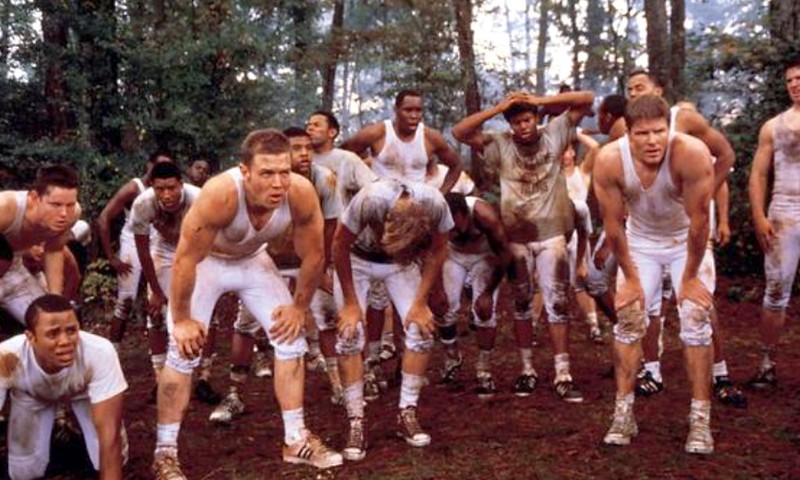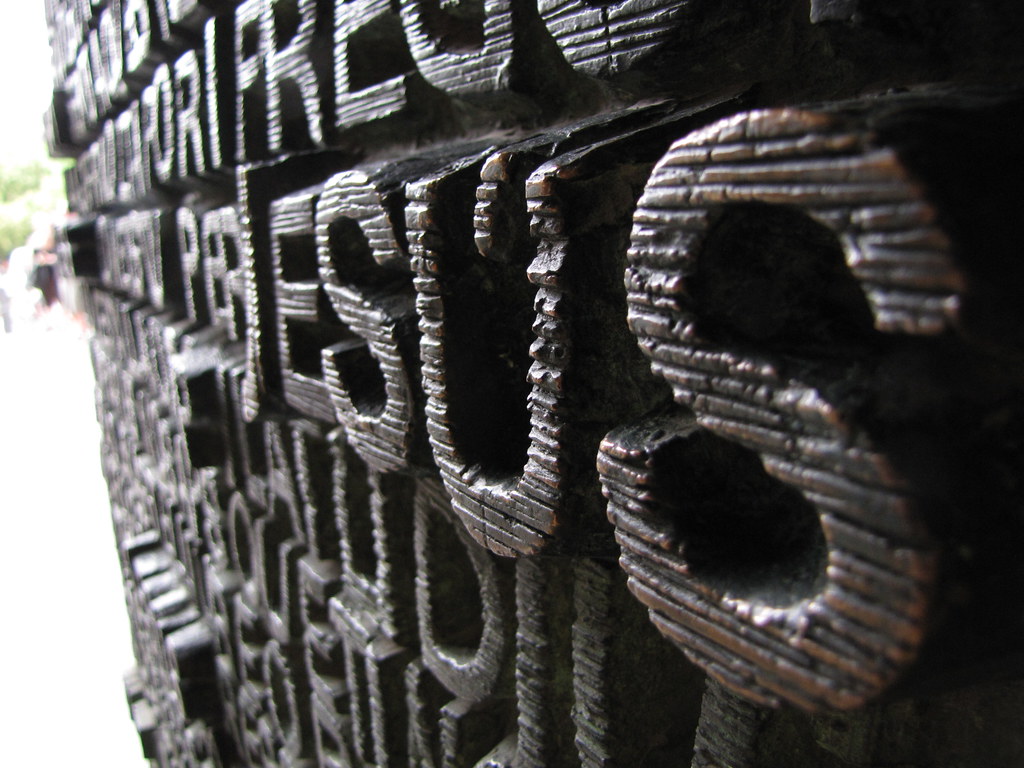The sky looks great out over Deception Bay this evening. Just thought I'd share.

Culture change is tough - but it is worth it!!! I was reminded of this as I watched the movie Remember the Titans. A coach dropped into a chaotic situation must bring culture change for the team to survive... but he doesn't just want it to survive he wants it to succeed, and to dominate. In a way we want our ministries to do likewise so what ideas for culture change can we take from Coach Boon?

If Jesus is King, what does that mean for what we want to do with out lives? [Image by Chris Bellerophon Dotson on flickr]

Reminded again and again about what we are created for. We are created for worship! But because there are some people who do not worship, we have been given a mission... to go and show people they were created to worship! - photo on Flickr by llamatofu

Do we look to appease our emotions, troubles, discomforts with earthy things that may provide some release temporarily, or do we look to God who is the source of complete satisfaction? [Image by donald_palansky_photography on flickr]

The sky looks great out over Deception Bay this evening. Just thought I'd share.

 Gyms are a place where we group together a whole heap of exercise machines in one spot so you can do a range of physical workouts at your own convenience. In recent years the gym industry has boomed. Why? Well I think it's having a location to go to, which you pay for, away from your home that motivates you to actually go and do a physical workout. At home it's too easy to relax and slack off. But if you know you're having 90 minutes at the gym, most of that will be used up on the machines. Plus if your paying $10 or more a week for the privilege of using that equipment you're going to want to go numerous times a week so you get your money's worth. In the lifestyle of today people are paying for that 'motivation' just as much as they're paying for state-of-the-art exercise equipment.
Gyms are a place where we group together a whole heap of exercise machines in one spot so you can do a range of physical workouts at your own convenience. In recent years the gym industry has boomed. Why? Well I think it's having a location to go to, which you pay for, away from your home that motivates you to actually go and do a physical workout. At home it's too easy to relax and slack off. But if you know you're having 90 minutes at the gym, most of that will be used up on the machines. Plus if your paying $10 or more a week for the privilege of using that equipment you're going to want to go numerous times a week so you get your money's worth. In the lifestyle of today people are paying for that 'motivation' just as much as they're paying for state-of-the-art exercise equipment. And since that is the point where all Christianity starts (acknowledging Jesus as Lord and Saviour) then this passage is a great place to look at the very essence of what Christian and Church life should look like. Let's 'draw near' to Jesus - we have the chance to have an intimate relationship with God, that's something of great worth that we should never take for granted. Then we must hold 'unswervingly' to the faith we now proclaim, it's like we have this goal now that God has promised us through faith and we must head towards it - directly and in a straight line, never deviating no matter the cost or pain. I love that idea, just steadfastly doing life by the faith I profess, but only doing it because I know God who has promised that my life is safe in him is completely faithful, so no matter the pain or trials I go through I know God has my life safely in his hands and serving him is better even than my own body staying safe and unhurt.
And since that is the point where all Christianity starts (acknowledging Jesus as Lord and Saviour) then this passage is a great place to look at the very essence of what Christian and Church life should look like. Let's 'draw near' to Jesus - we have the chance to have an intimate relationship with God, that's something of great worth that we should never take for granted. Then we must hold 'unswervingly' to the faith we now proclaim, it's like we have this goal now that God has promised us through faith and we must head towards it - directly and in a straight line, never deviating no matter the cost or pain. I love that idea, just steadfastly doing life by the faith I profess, but only doing it because I know God who has promised that my life is safe in him is completely faithful, so no matter the pain or trials I go through I know God has my life safely in his hands and serving him is better even than my own body staying safe and unhurt.Whatever its claim to rational truth, it is an empirical truth that secular atheism just doesn't produce a larger quantity of community generosity than religion. I am not saying that atheists don't generously give to the lives of others: many manifestly do, and many better than religious folk. But as a cause celebre, secular atheism just doesn't seem to have the ideological muscle to produce 2700 bright-eyed serving volunteers overnight: religion does.I found it an insightful and interesting read.
If we had to pay the penalty for our own sins, we would have to suffer eternally in separation from God. However, Jesus did not suffer eternally. There are two reasons for this difference: (a) If we suffered for our own sins, we would never be able to make ourselves right with God again. There would be no hope because there would be no way to live again and earn perfect righteousness before God, and there would be no way to undo our sinful nature and make it right. Moreover, we would continue to exist as sinners who would not suffer with pure hearts of righteousness before God... (b) Jesus was able to bear all the wrath of God against our sin and to bear it to the end. No mere man could ever have done thing, but by the virtue of the union of divine and human natures in himself, Jesus was able to... If Christ had not paid the full penalty, there would still be condemnation left for us. But since he has paid the full penalty that is due to us,"There is therefore now no condemnation for those who are in Christ Jesus" (Rom 8:1).
~Wayne Grudem Systematic Theology p 577-578
The view of Chirst's death presented here has frequently been called the theory of "penal substitution." Christ's death was 'penal' in that he bore a penalty when he died. His death was also a 'substitution' in that he was a substitute for us when he died...
...The blood of Christ is the clear outward evidence that his life blood was poured out hen he died a sacrificial death to pauy for our redemption - "the blood of Christ" means his death in its saving [substitutional] aspects... By the blood of Christ our consciences are cleansed (Heb 9:14), we gain bold access to God in worship and prayer (Heb 10:19), we are progressively cleansed from remaining sin (1John 1:7; Rev 1:5), we are able to conquer the accuser of the brethren (Rev 12:10-11) and we are rescued out of a sinful way of life (1 Peter 1:18-19). Scripture speaks so much about the blood of Christ because its shedding was very clear evidence that his life was being given in judicial exertution (that it, he was condemned to death and died paying a penalty imposed both by an earthly human judge and by God himself in heaven). Scripture's emphasis on the blood of Christ also shows the clear connection between Christ's death and the many sacrifices in the Old Testament that involved the pouring out of the life blood of the sacrificial animal...
~Wayne Grudem Systematic Theology p579
Apologetics is an answer to the "why" question after you've already answered the "what" question. The what question, of course, is, "What is the gospel?" But when you call people to believe in the gospel and they ask, "Why should I believe that?"---then you need apologetics.Tim Keller has written a great article on Apologetics over on The Gospel Coalition website. His article (here) takes a look at what it means to answer that why question. And how important it is to do so. When I look at my role as pastor, I see this being one of the core functions I have. Even people who have grown up in the church for years can suddenly finding themselves asking those why questions. My favourite part of the job is to delve into that with them and find a solid theological answer.
However, the trouble with an exclusively rationalistic apologetic ("I'm going to prove to you that God exists, that Jesus is the Son of God, the Bible is true," etc.) is that it does, in a sense, put God on trial before supposedly neutral, perfectly rational people sitting objectively on the throne of Reason. That doesn't fit with what the Bible says about the reality of sin and the always prejudiced, distorted thinking produced by unbelief. On the other hand, an exclusively subjectivist apologetic ("Invite Jesus into your life and he'll solve all your problems, but I can't give you any good reasons, just trust with your heart") also fails to bring conviction of real sin or of need. There will be no joy in the grace of Jesus unless people see they're lost. Thus a gospel-shaped apologetic must not simply present Christianity, it must also challenge the non-believer's worldview and show where it, and they, have a real problem.
Our understanding of Christ's nature is crucial here... He is the eternal, preexistent, Second Person of the Trinity. He is God in the same sense and to the same degree as is the Father, a sense in which no other human has ever been or will ever be divine. To his deity he added humanity. He did not give up his deity in any respect, but only the independent exercise of his divine attributes.This quote slams home the fact that Jesus was not only the perfect person to atone our sins, but the only one who could do so. Marrying the human and divine natures of Jesus is key to understanding the atonement. It is also instrumental in giving us an idea of the length God went to to atone the sins of his people. God didn't have to provide a perfect atonement for sin. He could have left it up to us to keep living under the laws, trying to atone in our own way, and continuing to fail. But it was his love that meant he sent Jesus. Jesus' love meant he was willing to give up the 'independent exercise of his divine attributes' and limit himself to the human form. Not only that but then be mistreated so harshly by his own creations, before being killed and experiencing God's wrath for all our sin.
In our understanding, Jesus' humanity means that his atoning death is applicable to human beings. Because Jesus was really one of us, he was able to redeem us. He was not an outsider attempting to do something for us. He was a genuine human being representing the rest of us... Not only is Jesus human; he is completely human. He took not merely the physical nature of a human being, but the full psychological makeup of humanity as well. He felt the full gamut of normal human emotions. Thus he was able to redeem all of human nature, for he assumed all of what it means to be truly human.
In addition, Jesus' death is of sufficient value to atone for the entire human race. The death of an ordinary human could scarcely have sufficient value to cover his or her own sins, let alone those of the whole race. But Jesus' death is of infinite worth. As God, Jesus did not have to die. In dying he did something God would never have to do. Because he was sinless, he did not have to die in payment for his own ins. Thus his death can atone for the sins of all humankind.
~Millard Erickson, Christian Theology, p821-822
"The Hebrew word most commonly used in the Old Testament for the various types of atonement is kaphar... The word literally means 'to cover.' One was delivered from punishment by the interposing of something between one's sin and God. God then saw the atoning sacrifice rather than the sin. The covering of the sin meant that the penalty no longer had to be exacted from the sinner."
~Millard Erickson, Christian Theology, p822
'Although God's punishment of sin does serve as a deterrent against further sinning and as a warning to those who observe it, this is not the primary reason why God punishes sin. The primary reason is that God's righteousness demands it, so that he might be glorified in the universe that he has created. He is the Lord who pracitices "steadfast love, justice, and righteousness in the earth; for all these things I delight, says the LORD" (Jer. 9:24)'We know that God is genuine, he is who he says he is. We also know that his purity includes complete holiness, not allowing any evil or ungodliness into his presence. Because of that he must be righteous and only relate with those who have no ungodliness infecting their life (because to do so would ruin his purity, his integrity and ultimately negate his divinity). So he must be just and punish those who sin - who allow ungodliness to infect their lives (which through the seed of humanity is all of us - no one escapes that justice).
~Wayne Grudem, Systematic Theology, p509
Genesis 3:1-7 recounts the first sin of the human race, but that far from exhausts the biblical references to the fall... the fall is integral to the whole biblical message...We see that no matter the kind of sin, all sin is aimed at God. Romans 1:19-23 (ESV) says;
The most characteristic feature of sin is that it is directed against God (Psalm 51:4; Romans 8:7; James 4:4). Any minimizing of this, such as the notion of sin as selfishness, seriously underestimates its gravity... In the fall, humanity snatched at equality with God, attempted to assert its independence of him and questioned the Creator's integrity and loving provision for it.
Bruce Milne, Know The Truth, p128-131
"Why would the Christian Scriptures mention the games? To help us upgrade our two weeks of Olympic watching by opening our eyes to what they have to say about God, the gospel, and the Christian life."

